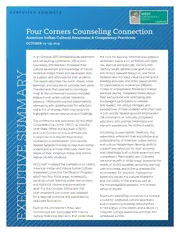
ERIC ED598720: Four Corners Counseling Connection: American Indian Cultural Awareness & Competency Practicum (October 23-25, 2015). Executive Summary PDF
Preview ERIC ED598720: Four Corners Counseling Connection: American Indian Cultural Awareness & Competency Practicum (October 23-25, 2015). Executive Summary
executive summary Four Corners Counseling Connection American Indian Cultural Awareness & Competency Practicum OCTOBER 23–25, 2015 In an October 2015 professional development the tone for learning. Informational sessions and networking conference, 100 school addressed topics such as federal and state counselors and teachers increased their law, spiritual perspectives, learning and cultural awareness and knowledge of Native identity issues, generational grief, culture Y American Indian Tribes and developed skills and history, relevant resources, and more. to support and advocate for their students. Sessions also included visual journaling and R This report describes the event, shares initial beading activities, and other opportunities learnings, and touches on possible next steps. for participants to experience different A The elements that seemed to contribute modes of engagement. Presenters shared most to the conference’s success included personal stories, integrated details about frequent and varied cultural reverence their background and upbringing, and M sessions, information-packed presentations encouraged participants to validate alternating with opportunities for reflection, and respect the unique heritages and and a mix of strategy-filled segments that perspectives of their students who often walk M highlighted relevant resources and materials. in two worlds. Several sessions emphasized the importance of culturally competent The conference was sponsored by the West educators who provide meaningful and U Comprehensive Center (WCC) at WestEd, relevant experiences for AI/AN students. Utah State Office of Education (USOE), and Utah Division of Arts and Museums According to participants’ feedback, the S in response to a request from school experience enhanced their knowledge and counselors in northeastern Arizona who understanding of American Indian history E desired targeted training to help them better and culture, helped them develop skills to understand and more effectively meet the support and advocate for their students, needs of their American Indian and Alaska and collectively built cultural awareness and V Native (AI/AN) students. competency. Participants also indicated personal growth in three areas: assessing the I WCC staff modeled the conference on Utah’s needs of AI/AN students, designing learning T American Indian and Alaska Native Cultural plan outcomes, and building a respectful Awareness Level One Certification Program, environment for students. Participants U which has four focus areas: sovereignty, especially valued the cultural reverence social structure, learning styles and process, and spirituality of the event as well as and historical trauma and generational the knowledgeable speakers who shared C grief. For the October 2015 event, the personal stories. Utah program’s curriculum was adapted E for a regional audience and presented by Practicum debriefing conversations indicate a need for additional cultural awareness seasoned facilitators. X and competency-building opportunities Each of the conference’s three days for educators in the region, and a desire to commenced and concluded with moving integrate cultural awareness activities into E cultural reverence segments that established scheduled events.
